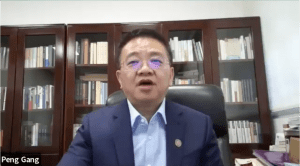
PENG Gang, Vice President and Provost of Tsinghua University and Chair of the Executive Committee of the Global MOOC and Online Education Alliance, opened the Online Education Dialogue 2023 with a clear vision of the transformative potential of artificial intelligence (AI) in higher education. His insights, grounded in his extensive experience in the field of university teaching and learning, provide a compelling perspective on the challenges and opportunities presented by AI.
In his opening remark, PENG Gang outlined three key aspects for discussion, each substantiated by his understanding of the current landscape of AI in higher education:
- Adapting to the Rapid Development of AI: PENG Gang emphasized the need for higher education to adapt to the rapid development of AI technology and make necessary preparations. He stated, “The tools and applications of generative AI are evolving rapidly, causing disruptive changes in many fields.” This claim underscores the urgency for higher education institutions to stay abreast of AI advancements and integrate them into their systems and curricula.
- Exploring Opportunities and Challenges in the AI Era: PENG Gang highlighted the dual nature of AI’s impact on higher education, presenting both opportunities and challenges. He suggested, “We should explore the opportunities and challenges that higher education faces in the AI era. How can AI reshape higher education, improve teaching quality, achieve efficient management and scientific governance?” This perspective invites a balanced view of AI’s role in higher education, acknowledging its potential to enhance educational outcomes while also recognizing the complexities it introduces.
- Envisioning the Future of Higher Education in the AI Era: Looking towards the future, PENG Gang proposed exploring “the future development, international cooperation models, and potential of higher education in the AI era.” His forward-looking stance encourages educators and policymakers to not only react to current AI trends but also proactively shape the future trajectory of AI in higher education.
PENG Gang’s emphasis on the shift from cultivating problem solvers to problem definers is particularly noteworthy. He stated, “With all these shifts of appearance of AI, higher education’s focus should shift from cultivating more problem solvers into problem definers.” This claim, backed by his understanding of the transformative potential of AI, underscores the need for a paradigm shift in higher education objectives and outcomes.

As the host of the dialogue, I, Enoch Wong, found it particularly interesting that PENG Gang emphasized AI as a tool to assist many different aspects of higher education. He mentioned that AI is not here to replace, but to enhance the quality of teaching, enable more efficient management, and provide a more scientific way to govern. These points resonate with my understanding of the role of AI in education – it is a tool that, when used effectively, can significantly enhance the learning experience and the management of educational institutions.
I also found PENG Gang’s point on international cooperation to be particularly intriguing. In an increasingly interconnected world, the role of AI in facilitating and accelerating international cooperation in higher education is a topic worth exploring. How can AI help to foster collaboration between institutions, educators, and students across borders? This is a question that I believe warrants further discussion and exploration.
Reflecting on PENG Gang’s insights, it is clear that the integration of AI into higher education is not a straightforward process. It requires careful consideration of the rapidly evolving landscape of AI, a balanced view of its opportunities and challenges, and a forward-looking approach to shaping its future role in higher education.
As we continue to navigate the AI-driven digital transformation of education, PENG Gang’s perspective invites us to consider a critical question: How can we ensure that the integration of AI into higher education leads to more equitable, high-quality, and innovative learning experiences for all students?
Note: “OED Host Reflect” is a series where the OED Host (Enoch Wong, Senior Advisor of Online Education and International Cooperation at Tsinghua University) summarizes messages delivered by speakers during the OED while attempting to make additional contributions to further discussion around the topic. Moreover, the views and opinions expressed in this program are those of the speakers and do not necessarily reflect the views or positions of any entities they represent. Last but not least, you are most welcome to watch the replay of OED at: https://www.xuetangx.com/live/live20230515m002intl/live20230515m002/16741468/34631590
